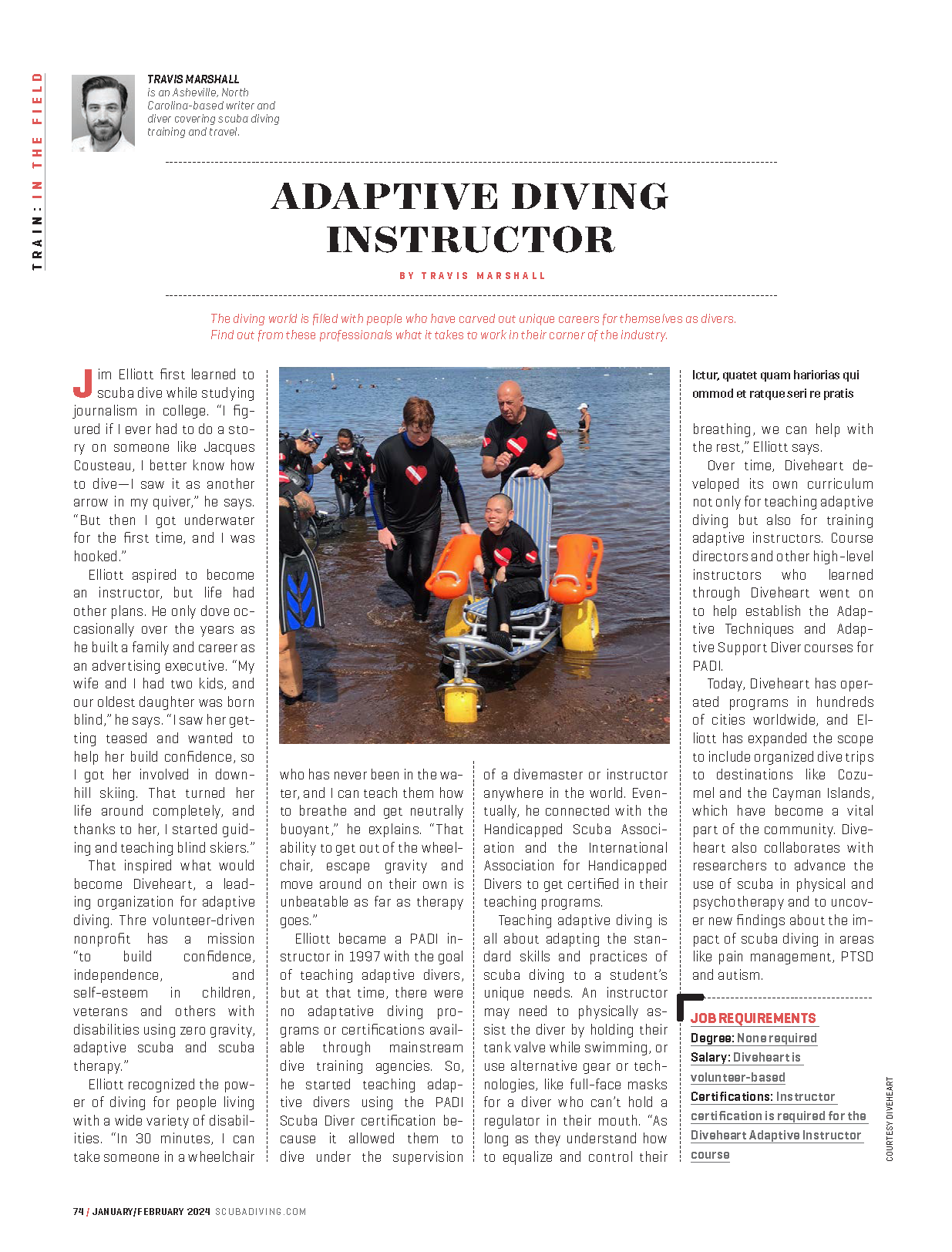
Diveheart
TRAVIS MARSHALL is a writer and diver based in Asheville, North Carolina, covering scuba diving training and travel.
ADAPTIVE DIVING INSTRUCTOR BY TRAVIS MARSHALL
The diving world is filled with people who have carved out unique careers for themselves as divers. Find out from these professionals what it takes to work in their corner of the industry.
Jim Elliott first learned to scuba dive while studying journalism in college. “I figured if I ever had to do a story on someone like Jacques Cousteau, I better know how to dive—I saw it as another arrow in my quiver,” he says. “But then I got underwater for the first time, and I was hooked.”
Elliott aspired to become an instructor, but life had other plans. He only dove occasionally over the years as he built a family and career as an advertising executive. “My wife and I had two kids, and our oldest daughter was born blind,” he says. “I saw her getting teased and wanted to help her build confidence, so I got her involved in downhill skiing. That turned her life around completely, and thanks to her, I started guiding and teaching blind skiers.”
That inspired what would become Diveheart, a leading organization for adaptive diving. The volunteer-driven nonprofit has a mission “to build confidence, independence, and self-esteem in children, veterans, and others with disabilities using zero gravity, adaptive scuba, and scuba therapy.”
Elliott recognized the power of diving for people living with a wide variety of disabilities. “In 30 minutes, I can take someone in a wheelchair who has never been in the water, and I can teach them how to breathe and get neutrally buoyant,” he explains. “That ability to get out of the wheelchair, escape gravity and move around on their own is unbeatable as far as therapy goes.”
Elliott became a PADI instructor in 1997 with the goal of teaching adaptive divers, but at that time, there were no adaptive diving programs or certifications available through mainstream dive training agencies. So, he started teaching adaptive divers using the PADI Scuba Diver certification because it allowed them to dive under the supervision of a divemaster or instructor anywhere in the world. Eventually, he connected with the Handicapped Scuba Association and the International Association for Handicapped Divers to get certified in their teaching programs.
Teaching adaptive diving is all about adapting the standard skills and practices of scuba diving to a student’s unique needs. An instructor may need to physically assist the diver by holding their tank valve while swimming, or use alternative gear or technologies, like full-face masks for a diver who can’t hold a regulator in their mouth. “As long as they understand how to equalize and control their breathing, we can help with the rest,” Elliott says.
Over time, Diveheart developed its own curriculum not only for teaching adaptive diving but also for training adaptive instructors. Course directors and other high-level instructors who learned through Diveheart went on to help establish the Adaptive Techniques and Adaptive Support Diver courses for PADI.
Today, Diveheart has operated programs in hundreds of cities worldwide, and Elliott has expanded the scope to include organized dive trips to destinations like Cozumel and the Cayman Islands, which have become a vital part of the community. Diveheart also collaborates with researchers to advance the use of scuba in physical and psychotherapy and to uncover new findings about the impact of scuba diving in areas like pain management, PTSD, and autism.
